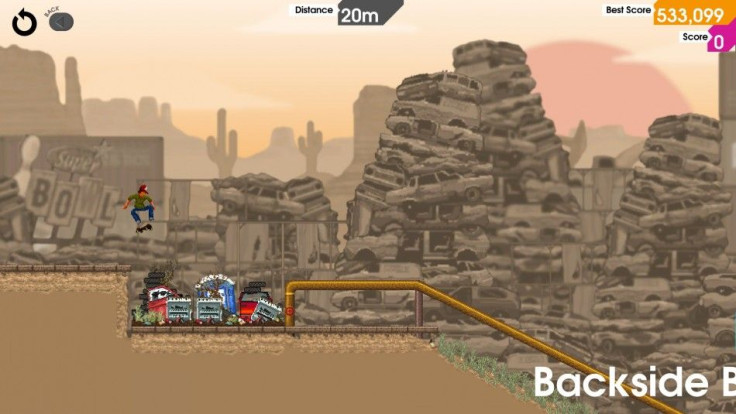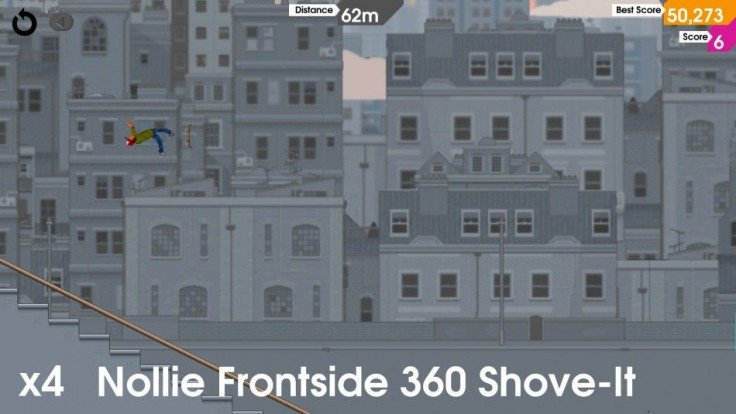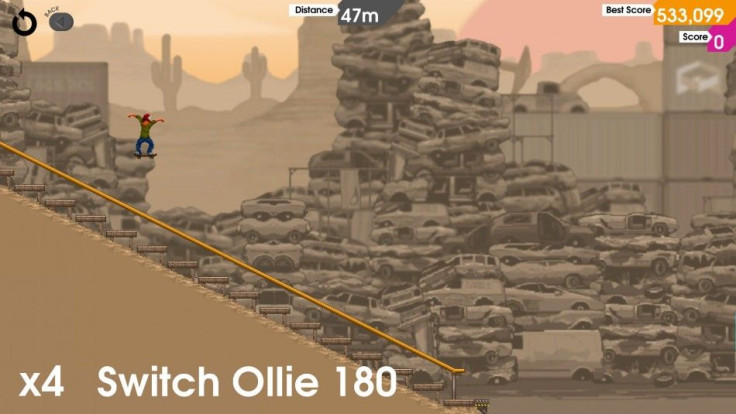Six months after OlliOlli skated its way onto the PS Vita, Roll7 have ported its arcade skateboarding game over to the PC and those interested in kickflipping their way across five environments (and dozens of levels) will now find OlliOlli waiting for them on Steam.
OlliOlli looks to mesh gamers' ongoing nostalgia for low-resolution art assets with the fast-paced, punishing action that many still associate with the arcade era; two design choices which may or may not have played a significant role in my own purchasing decision. Gameplay occurs in short bursts, as you navigate a series of levels that take less than a minute finish, and each of OlliOlli's many stages offers a variety of potential goals for players to complete during a run.
It's an enticing mixture, on paper, especially if you're one of the millions of gamers forced to spend an hour or two commuting to/from work each day. Which is probably why OlliOlli was such a hit when it debuted earlier this year. The sheer amount of content included in the game would seemingly make it an excellent value buy for any cost-conscious gamer that needs something new to play on their PC, too.
Unfortunately, my own experiences with OlliOlli didn't stack up to a number of similarly priced games on the Steam marketplace. I'm not going to go as far as saying OlliOlli is a bad game, because I can sort of see the appeal. But it absolutely falls short of being a project I'd recommend to someone looking for a new PC game to play.
Originally released on the PS Vita, back in January, OlliOlli is (at its core) a side-scrolling platformer that tests players' reflexes in much the same way as games like Bit.Trip.Runner. As an unidentified skateboarder, players will make their way across dozens of levels that feature all manner of ramps, rails, staircases and other such obstacles intended to stop you dead in your tracks.
Each stage tends to last between 15 and 30 seconds, giving you just enough time to pull off a couple of tricks/combinations before reaching the crowd of onlookers gathered at the end of the run. Tricks have been mapped to the Left Analog Stick, at least if you're playing OlliOlli with an Xbox 360 controller, and you'll rely on the shoulder buttons for mid-air rotation.
Many will also be happy to hear that, while reaching the finish line will provide a challenge in its own right, players will also find five objectives waiting for them on each map. The tasks seem to have been inspired by the Tony Hawk franchise, mixing point-based objectives with calls for specific tricks and/or the collection of wrenches and spray cans that spread throughout many of OlliOlli's stages.
You'll also have to pay attention to your momentum as you make your way down each course, with the quality of your landings dictating whether or not you lose speed after tricks, because going too fast/slow in certain sections practically guarantees an unpleasant meeting with the pavement. Especially once OlliOlli begins to stack staircases and other obstacles on top of one another.

Of course, as I mentioned before, the levels in OlliOlli aren't especially long. But you'd be shocked just how difficult it can be to keep yourself from eating gravel in the game's bite-sized stages. Thankfully, your repeated attempts at completing each level's objectives will be accompanied by one of the better video game soundtracks to emerge during 2014.
I'd wager many players won't recognize most of the music used in OlliOlli -- though you're doing yourself a serious disservice if you don't begin familiarizing yourself with the work of Ackryte, Long Arm or The Qemists -- but I also can't imagine anyone coming away from OlliOlli with anything but positive things to say about the game's soundtrack. The lineup includes a variety of genres, offering a little something for fans of everything from jazz to EDM.
Older players will also appreciate the lack of vocal track on most of the music in OlliOlli, a subtle but appreciated nod to an era when game soundtracks weren't just compilations of whatever music has been getting radio play in recent months/year. Combined with the game's relatively simple art-style, which makes use of low-res art textures that wouldn't look out of place on a Super Nintendo or Sega Genesis, OlliOlli is the sort of game that (had I enjoyed it more) would probably have made an excellent custom-built arcade cabinet.

Sadly, any enjoyment I might have derived from my time with OlliOlli was heavily diminished, both by the game's highly repetitive nature and the truly abysmal control scheme that you're forced to grapple with any time you sit down for a few minutes/hours of OlliOlli. Expecting the sort of precision offered by AAA games is probably a bit much, considering the massive difference in budgets, but I don't think it's wrong for me to expect better than what's present in OlliOlli.
It's the sort of issue you didn't hear anything about during the PS Vita launch, because the game is being played on uniform hardware that Roll7 had specs on for months/years ahead of launch, but that should have been anticipated when bringing OlliOlli over to the incredibly fractured PC ecosystem. While my own machine is hardly a top-of-the-line gaming rig, I've yet to encounter a game that simply couldn't be run on my computer, and I certainly don't encounter the same input lag that I found waiting in OlliOlli.
Worse, even when I didn't feel like I had to try and time my inputs slightly earlier than I needed them to register, I was shocked at how poorly the game seems to process analog inputs. After several hours playing OlliOlli, I'm still finding it near impossible to pull off a trick when exiting a grind - a technique that is taught to you in the game's tutorials - and am instead frequently greeted with the sight of yet another Ollie/Nollie when transitioning from one rail to the next.
It's absolutely the sort of issue that could be fixed at some point after launch, at which point I might be willing to take another look at OlliOlli, but I can hardly base my impressions of the game on a theoretical improvements that may or may not ever materialize.

OlliOlli Review - Final Verdict
At the end of the day, OlliOlli is one of those games that I had a fair amount of difficulty assigning a score to, in no small part because the game's soundtrack has introduced me to some incredibly talented musicians that I'd likely never have discovered on my own.
To be clear, I still can't say I was especially happy with my decision to spend $13 on the game, given just how little I find myself wanting to return to OlliOlli now that I've finished writing about the game. In fact, were reviews not a significant part of how I make my living, I suspect I'd have uninstalled OlliOlli several days ago. In the span of about 48 hours it went from incredibly frustrating to mildly entertaining to boring. And that middle phase wasn't nearly long enough to justify the other two.
On the other hand, if OlliOlli turns out to be a game that you enjoy playing, there aren't many games on Steam that will offer you the same dollar-to-hours-of-entertainment ratio as Roll7's latest game. With 150 stages to choose from, and Daily Grinds to keep you coming back to OlliOlli after you've finished the "campaign", it's safe to say that you're going to need more than a couple of hours to finish everything in OlliOlli. And I seriously can't say enough about the musical selection for the game.
But the soundtrack isn't why I bought OlliOlli. I bought the game because I was hoping for something akin to 2D Tony Hawk; not the latest in a long line of games that derive their longevity from difficulty that feels unearned. There are too many times when hitting a Perfect grind or landing feels inconsistent, or when the less-than-stellar analog sticks on the Xbox 360 controller prove inadequate for the series of quarter, half and full-circle rotations needed to pull off tricks.
It may have some great tunes but, until those controls aren't quite so terrible, I'm going to have assume that OlliOlli was best left on the PS Vita. But, just as I mentioned in the headline, your mileage may vary.
Score - 3/5
Have you spent any time playing OlliOlli since the game made the jump to PC? Think Scott was far too hard on one or more aspects of the OlliOlli gameplay experience? Don't understand why people would be interested in such brutally-difficult platformers in the first place?
Let us know in the comments section!

















